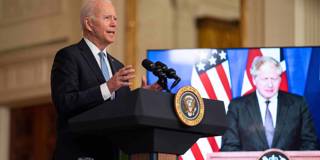There may be good reasons why Australia decided American submarines would be more suitable than French boats as a defense against China. But what the United Kingdom’s interests in the region are, apart from puffing up a self-image of “global Britain” after Brexit, is less clear.
NEW YORK – Two days before the Normandy landings in June 1944, Charles de Gaulle demanded the right to govern France after it was liberated by the Allies. Franklin D. Roosevelt, who detested de Gaulle, had no intention of agreeing to this. Winston Churchill, who rather admired de Gaulle’s illusions of grandeur, sided with Roosevelt. He told the Free French leader that if he had to choose between de Gaulle and Roosevelt, he would always choose Roosevelt.
Churchill’s attitude was entirely understandable. Europe was occupied by Nazi Germany. The Free French were largely a symbolic force. And Britain was one of the three major Allied powers. Later, however, Britain’s choice to cling to the United States come what may (with one or two exceptions, including the Suez crisis in 1956 and the Balkan war in the 1990s) came with a heavy price.
Flush with wartime victory, Britain turned down every opportunity to shape European institutions in the 1950s, and when Prime Minister Harold Macmillan concluded in the early 1960s that Britain could remain a serious country only within the European Economic Community, de Gaulle stood in his way. British membership of the EEC was vetoed by the general in 1963, and again in 1967.

NEW YORK – Two days before the Normandy landings in June 1944, Charles de Gaulle demanded the right to govern France after it was liberated by the Allies. Franklin D. Roosevelt, who detested de Gaulle, had no intention of agreeing to this. Winston Churchill, who rather admired de Gaulle’s illusions of grandeur, sided with Roosevelt. He told the Free French leader that if he had to choose between de Gaulle and Roosevelt, he would always choose Roosevelt.
Churchill’s attitude was entirely understandable. Europe was occupied by Nazi Germany. The Free French were largely a symbolic force. And Britain was one of the three major Allied powers. Later, however, Britain’s choice to cling to the United States come what may (with one or two exceptions, including the Suez crisis in 1956 and the Balkan war in the 1990s) came with a heavy price.
Flush with wartime victory, Britain turned down every opportunity to shape European institutions in the 1950s, and when Prime Minister Harold Macmillan concluded in the early 1960s that Britain could remain a serious country only within the European Economic Community, de Gaulle stood in his way. British membership of the EEC was vetoed by the general in 1963, and again in 1967.